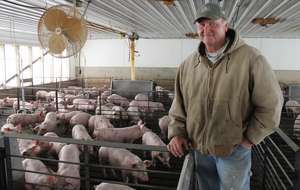Part II: Farmers Recycled before “Green Efforts" Began
Farmers raise corn and soybeans, which make the feed for our hogs. By feeding grain to our hogs, we add value to the raw corn and soybeans. The process of growing pigs and producing that great tasting bacon also generates “natural fertilizer.”
Natural fertilizer is another name for manure, and it’s not waste – it’s a valuable asset! A grain farmer thinks of manure as a valuable asset because it’s a very effective fertilizer, which is needed to produce high-yielding crops. The natural fertilizer that my pigs produce is in high demand by area farmers, who put down it on their farm ground to serve as plant food for next year’s crop. You might even say that farmers were recycling manure before the rest of society started adopting green efforts.
One advantage of recycling manure is that it helps reduce the cost of crop inputs. Commercial fertilizer is very expensive, so using manure helps reduce crop input costs. Using this locally produced fertilizer is a win-win deal: crop farmers need fertilizer and livestock farmers must dispose of manure in an environmentally sound manner.
Applying manure is heavily controlled by regulations. I’m required to file a Manure Management Plan with county officials and the Iowa Department of Natural Resources. This plan includes soil test results, crop rotation plans, soil types and the erodibility of the soil. Every detail you can imagine needs to be spelled out in this document! What it all boils down to is this: it’s against the law to pollute the surface or ground waters of the State of Iowa.
While I support efforts to protect the environment, I also believe we need to exercise some common sense. These laws, which prompt rules, often begin with the best of intentions. Not all regulations produce the desired outcomes, however. For example, all of the regulations that groups like Iowa Citizens for Community Improvement (ICCI) helped pass have resulted in many smaller producers calling it quits!
Regulations can be extremely costly to farmers, and this is one reason I’ve become so active in trying to control regulations. Lawmakers need to hear how laws and rules will impact farmers. The general public, which largely influences those political votes, also has a need to be in the know. That’s why I’m inviting you to watch my video blog series to learn more about how and why I raise pork. Please contact me with any questions you have about modern day hog production. I’ll look forward to some online dialogue!
